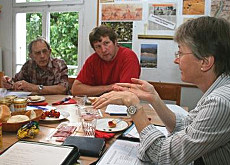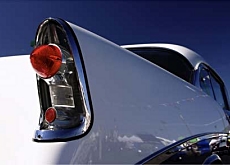Swiss legacy lives on in Berne, Indiana

The small town of Berne in the US state of Indiana is proud of its Swiss heritage and keen to preserve traditions from the homeland.
An expression of this is the Swiss Days festival, which takes place annually at the end of July.
The four-day festival of Swiss food, drink and music attracts thousands of homesick Swiss from near and far. swissinfo took a look around.
Berne is a little piece of Switzerland in the American heartland: chalet-style houses, Swiss flags, Bernese bears and geraniums growing in window boxes. The descendants of the first settlers – a group of Mennonites from the Jura region – still place a value on the traditions of the homeland.
“Over the years the make-up of the Berne population has diversified,” said Mayor John Minch at the opening of Swiss Days. “But we are still united by our common values, such as faith in God, the importance of the family and upbringing, and a good work ethic.”
And the residents are still building on the legacy of the settlers. Minch recalls how the festival has grown over the past 30 years from a couple of stands on the roadside to a big social event.
Minch’s speech was followed by the swearing of allegiance to the American flag, the singing of the Star-Spangled Banner, and a poem to Berne entitled “My Home”.
From far and wide
As the festival got underway on Thursday the streets of Berne filled with people – women and men in traditional Swiss costume, young and old, locals and visitors from near and far. Even the Amish, who live outside the town, joined in.
“I was last here a couple of years ago, and I wanted to experience it again,” said John Neuenschwander, who had travelled from Wisconsin. His ancestors were Swiss “from the region of Bern”, but unfortunately he doesn’t speak any Swiss German.
The same goes for a married couple from Illinois. “We were in Switzerland for the first time this spring and we liked it very much. So when we heard about Swiss Days we didn’t want to miss it.”
The fact that the participants swissinfo meets only speak English doesn’t diminish their enthusiasm for the homeland one iota. Although they tend to have a clichéd view of Switzerland, a fact some are prepared to admit.
Hectic times
In the run-up to the official opening it was all go in the chamber of commerce that organised the event. Director Connie Potter and her staff had their work cut out trying to ensure that everything went smoothly.
On Thursday morning the streets were a hive of activity, as stands were set up. From midday on the smell of Bratwurst and sauerkraut filled the air. Folk music helped create the right atmosphere.
Jazz was on the programme for the first night, but the main musical attraction was expected to be a performance by the young yodler Taylor Ware from Tennessee on Friday. Now almost 13, Ware made headlines at the age of seven when she won a national yodel competition.
swissinfo, Rita Emch in Berne, Indiana
In 1852 a group of 70 Mennonites from the Jura in Switzerland came to the area.
In 1871 the community was registered as Berne and a train went through Berne for the first time.
The train connection resulted in more immigrants, mostly from Switzerland and Germany. Economic expansion began.
Berne today has around 4,150 inhabitants. Some 4,000 Amish have settled outside the town.
Berne is proud of its Swiss roots and the descendents of the settlers lay great value on the tradition of their forefathers’ home.
Swiss influence is everywhere: as conspicuous as the many Swiss names and coats of arms on shops and residential buildings is the floral decoration – geraniums line window boxes and roads.
Family names that give away their Swiss origins include Graber, Amstuz, Lehmann, Neuenschwander, Liechti and Sprunger.
Swiss Days has been taking place at the end of July in Berne for more than 30 years, recently attracting 20,000-30,000 visitors a year.
It is organised by the local chamber of commerce.
The programme includes Swiss food, music, dancing, exhibitions and other attractions.

In compliance with the JTI standards
More: SWI swissinfo.ch certified by the Journalism Trust Initiative











You can find an overview of ongoing debates with our journalists here . Please join us!
If you want to start a conversation about a topic raised in this article or want to report factual errors, email us at english@swissinfo.ch.